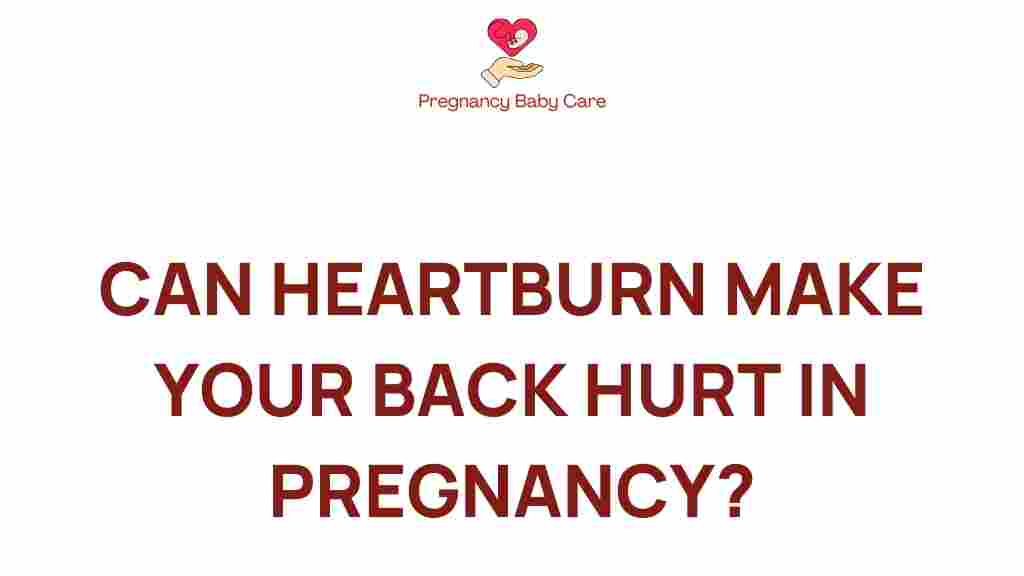Can Heartburn Really Cause Back Pain During Pregnancy?
Pregnancy is a beautiful journey filled with anticipation and joy, but it can also bring a host of discomforts. One of the lesser-discussed issues that many expectant mothers face is the link between heartburn and back pain. Understanding this connection is crucial for maintaining maternal health and wellness throughout pregnancy. In this article, we will explore the symptoms of heartburn, how it can lead to back pain, and provide some helpful tips for alleviating these discomforts.
Understanding Heartburn During Pregnancy
Heartburn, also known as acid reflux, is a common digestive issue that occurs when stomach acid backs up into the esophagus. This condition is particularly prevalent during pregnancy due to hormonal changes and physical pressure from the growing uterus. Here are some key points about heartburn in pregnancy:
- Symptoms: The primary symptoms of heartburn include a burning sensation in the chest, throat, and mouth, as well as a sour taste in the mouth.
- Causes: Hormonal changes, particularly increased progesterone, relax the lower esophageal sphincter, allowing stomach acid to escape.
- Timing: Heartburn is often worse in the second and third trimesters as the uterus expands and puts pressure on the stomach.
The Link Between Heartburn and Back Pain
Many pregnant women report experiencing back pain alongside heartburn. While heartburn and back pain are distinct issues, they can be interconnected due to several factors:
- Posture Changes: As the body adapts to the growing baby, posture changes can lead to tension in the back, which may exacerbate discomfort.
- Muscle Strain: The added weight of pregnancy can strain back muscles, which may be aggravated by the discomfort from heartburn.
- Stress and Discomfort: Persistent heartburn can lead to increased stress and anxiety, which can manifest as physical tension in the back.
Recognizing Symptoms of Back Pain Related to Heartburn
Identifying the symptoms of back pain that may be related to heartburn is essential for appropriate management. Common symptoms include:
- Dull, aching pain in the lower back
- Pain that worsens after eating or when lying down
- Sharp pain that radiates from the chest to the back
- Tightness or muscle soreness in the upper back
Managing Heartburn to Alleviate Back Pain
Managing heartburn effectively can help reduce associated back pain. Here are some strategies to consider:
1. Dietary Adjustments
Making changes to your diet can significantly impact heartburn symptoms:
- Avoid Trigger Foods: Identify and avoid foods that trigger your heartburn, such as spicy foods, citrus fruits, and chocolate.
- Smaller Meals: Eat smaller, more frequent meals instead of large ones to minimize pressure on the stomach.
- Stay Upright After Eating: Avoid lying down immediately after meals to allow proper digestion.
2. Lifestyle Modifications
In addition to dietary changes, consider these lifestyle modifications:
- Maintain Good Posture: Pay attention to your posture while sitting, standing, and sleeping.
- Wear Comfortable Clothing: Avoid tight clothing that can exacerbate discomfort.
- Stay Hydrated: Drink plenty of water throughout the day to aid digestion.
3. Relaxation Techniques
Reducing stress can alleviate both heartburn and back pain. Consider incorporating relaxation techniques into your daily routine:
- Deep Breathing: Practice deep breathing exercises to help relax your body and mind.
- Gentle Yoga: Engage in gentle yoga or stretching exercises to relieve tension in the back.
- Meditation: Spend a few minutes each day meditating to promote relaxation.
When to Seek Medical Advice
While heartburn is common during pregnancy, it’s important to know when to consult a healthcare professional. Seek medical advice if:
- Your heartburn is severe and persistent despite home remedies.
- You experience significant back pain that interferes with daily activities.
- You notice any unusual symptoms, such as severe headaches or vision changes.
Conclusion
In conclusion, heartburn can indeed be a contributor to back pain during pregnancy. Understanding the symptoms and managing them effectively can lead to improved maternal health and overall wellness. By making dietary adjustments, adopting healthy lifestyle choices, and practicing relaxation techniques, pregnant women can alleviate both heartburn and back pain. If you experience severe discomfort or unusual symptoms, it is essential to consult with your healthcare provider.
Remember that every pregnancy is unique, and what works for one individual may not work for another. Always prioritize your health and well-being during this special time.
For more information on maternal health and wellness, check out this helpful resource.
If you’re looking for more tips on managing digestive issues during pregnancy, read our article here.
This article is in the category Pregnancy and created by PregnancyBabyCare Team
